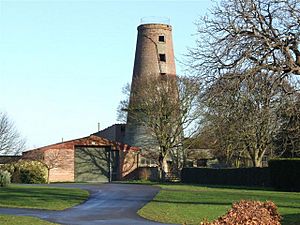Ingleborough Tower Windmill, West Walton facts for kids
Quick facts for kids West Walton, Ingleborough Tower Windmill |
|
|---|---|

Ingleborough Towermill, near the village of West Walton
|
|
| Origin | |
| Mill location | Mill Lane, West Walton |
| Grid reference | TF47391499 |
| Coordinates | 52°42′45.04″N 0°10′49.08″E / 52.7125111°N 0.1803000°E |
| Year built | 1824 |
Ingleborough Tower Windmill is an old windmill located about one mile north of the village of West Walton in Norfolk, England. It stands in the yard of Hill House Farm, next to a house and other farm buildings. This tall brick tower used to grind grain, but it doesn't work anymore. The mill tower is a very important historic building. It was given a special protection status in 1951, known as Grade II listed.
Contents
About the Windmill
Building the Mill
The Ingleborough Tower Windmill was built in 1824. It was a very tall building, standing over eight storeys high. The entire tower is made from strong bricks.
What it Looked Like
Near the middle of the tower, at the fourth floor level, there was a walkway or gallery. This allowed people to walk around the outside of the mill. Each floor of the mill had windows. On the south side, there were three windows.
At the very top of the tower, there was a special brick pattern. This pattern was just below where the roof used to sit. The tower once had a white, dome-shaped roof, called an ogee cap, but it has been removed. In 1980, railings were put around the top of the tower for safety.
The Sails and Inside
This windmill used to have six large sails. These sails were removed in 1940, so it could no longer use wind power. Inside the tower, all the floors and stairs are still there. However, all the machinery that used to grind grain has been taken out.
How the Mill Was Used
The Ingleborough Tower Windmill was an important part of the local community. In 1883, an old book called Kelly’s Directory listed the mill. It showed that the miller, who ran the mill, was also a baker and a farmer. This meant they used the mill to grind grain, baked bread, and worked on the farm. By 1904, the mill was even more advanced. It could be powered by both wind and steam engines, making it very efficient.
 | Jackie Robinson |
 | Jack Johnson |
 | Althea Gibson |
 | Arthur Ashe |
 | Muhammad Ali |

